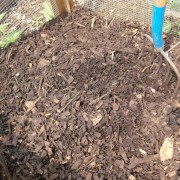Tips for Backyard Composting
Backyard composting is an excellent way to limit off-site disposal of your yard and kitchen waste, while creating a nourishing soil additive for your gardens. Adding compost to your garden will promote soil health, improve soil drainage and structure, loosen heavy soils, and suppress soil-borne plan diseases. Compost adds crucial micro-organisms, bacteria, and fungi threads for a more productive, healthy soil.
How to avoid a smelly compost pile
A properly tended compost pile won’t create unpleasant smells. By maintaining levels of air (oxygen) levels, moisture, and temperature, you can have a productive compost pile that will not offend your neighbors with any troubling smells.
The single most important tip in avoiding a stinky compost pile is making sure you have the correct ratio of “green matter” and “brown matter”.
Green matter includes such items as fruit and vegetable scraps, coffee grounds, and grass clippings. These items are high in nitrogen and decay very quickly. Brown matter includes leaves, straw, used coffee filters, and sawdust. This items are high in carbon and decay more slowly. An ideal ratio for composting is 1/3 greens to 2/3 browns.
Composting is the environmentally-friendly way to dispose of your food scraps and garden debris. According to the Wisconsin Department of Natural Resources, each year over 300,000 tons of yard materials is composted, saving all that waste from going to landfills and incinerators in Wisconsin.
Typically, composting does not require a licence or approval, as long as they are maintained in a nuisance-free manner. Always check with your local community ordinances to see if there are any backyard composting regulations. DO NOT compost foods such as meat, bones, dairy products or oils. These types of materials will attract animals and other unwanted pests.

